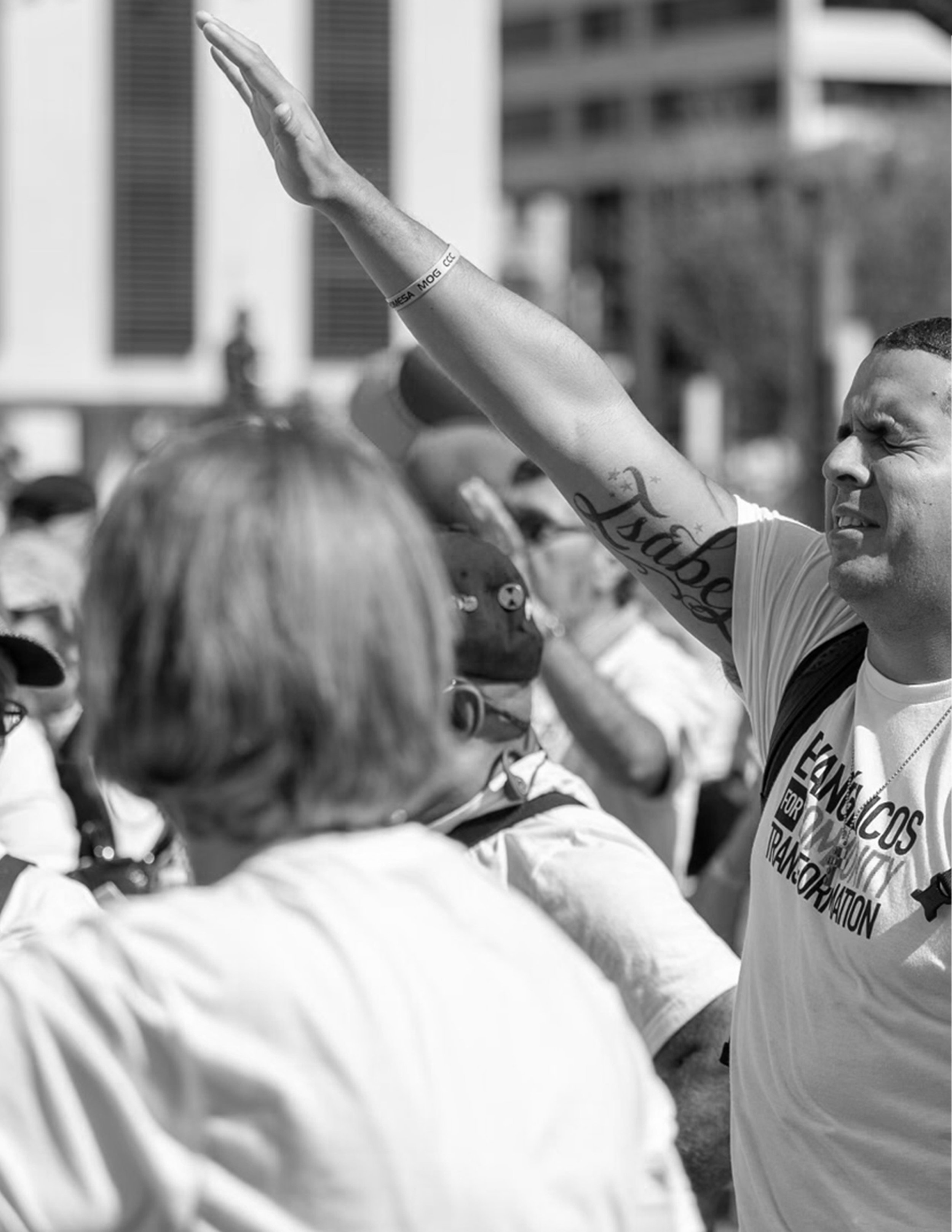
Leadership Development
for Community Transformation
Mission Talk’s Leadership Development for Community Transformation program equips churches to address the root causes of community problems.
Our Program
Mission Talk’s Leadership Development for Community Transformation program seeks to expand the vision of the local church by creating a sustainable church-based structure of justice-oriented ministries. The purpose of the program is to address the root causes of community problems by implementing research, engagement and spiritual discernment. Churches will be equipped to lead and organize communities for change, engage in communications and storytelling, conduct public policy analysis and mobilize for prophetic advocacy.
The program helps coach and develop leaders to implement justice and community transformation ministry in their local churches: Throughout the program, students learn strategies for building relationships with community members and organizations who can serve as partners in their outward facing work. Participants discern and ultimately identify a specific project focus in order to apply what they’ve learned in the program, have opportunities for peer to peer learning, and receive ongoing coaching from Mission Talk to implement change in their communities, cities and state.
WHAT WE DO
Focus Areas

01. Discover
Research & Community Engagement
This area focuses on training leaders to build inclusive relationships with key community members and organizations, ensuring diverse cultural and ethnic groups are represented. It helps leaders understand others’ concerns and approach public policy with a broader perspective. This work is grounded in assessing the root problems of communities and appreciating each congregation’s unique context, including its history, strengths, challenges, and potential future.
02. Discern
Reflection & Spiritual Discernment
This area emphasizes grounding the work in scripture and kingdom values to shape a theological vision for the common good. It involves reflection, communal spiritual discernment, research on community issues, and practical solutions. The five tasks of the church model are introduced to integrate community transformation into the church’s broader mission.
03. Strategize
Leading & Organizing Communities for Change
This area equips leaders to build a grassroots base through transformational relationships with neighbors, community leaders, and decision-makers. It teaches skills for one-on-one conversations, organizing meetings, and mobilizing their networks to drive community transformation and policy improvements.
04. Communicate
Art & Storytelling
This area focuses on equipping leaders with the skills to craft and deliver effective storytelling across key communications platforms, including earned media, social platforms, and legislative communication. Training includes public relations, media engagement, opinion writing, and creative content development. Leaders will learn to enhance messaging through creative arts and build strong branding, engage effectively with community stakeholders and elected officials, and create impactful content to advocate for their community’s needs.
05. Mobilize
Public Policy & Advocacy
This area teaches participants how state bills become law, analyze their impacts, and track legislation. It also covers effective advocacy strategies, including communicating the effects of complex bills to the faith community and elected officials to oppose harmful proposals.
Educational Pilgrimages
Experiential trips immerse participants in the lived realities of diverse communities, fostering reflection, understanding, and a commitment to justice. Each journey offers unique insights into historical and cultural challenges:
Black History Experience
Explore the profound history of African Americans, from the legacy of slavery and lynchings to the modern realities of mass incarceration. Visit landmarks like Dr. Martin Luther King Jr.'s church and residence, the Rosa Parks Museum, and the Legacy Museum, which traces racial injustice from enslavement to segregation. Reflect at the Memorial for Peace and Justice, honoring victims of racial terror, and the Freedom Sculpture Monument Park, celebrating resilience and progress.
Latino Immigrant Experience
Delve into the rich history of Latinos in the United States, from early Spanish-speaking settlements on the East Coast and Southwest to families whose land became part of the U.S. after the Mexican-American War. Learn about recent migration experiences marked by displacement, family separations, and resilience, reflecting the challenges and enduring strength of Latino communities in shaping America.
Asian Immigrant Experience
Engage with the history of Asian America through sites that tell stories of struggle, resilience, and identity. Visit immigration stations like Angel Island, where early Asian immigrants faced detention and interrogation, and walk through Japanese American concentration camps, where families were unjustly incarcerated during World War II. These landmarks reflect the challenges of exclusion and discrimination while honoring the enduring spirit of cultural preservation and community.
Native American Experience
Discover the sacred history, resilience, and cultural endurance of Native American communities, whose deep connection to the land and traditions has endured for thousands of years. Despite displacement, violence, and forced assimilation, Native nations have preserved their languages, ceremonies, and heritage. Visit sacred sites and cultural landmarks that honor their struggles, contributions, and ongoing efforts to sustain their legacy and sovereignty.
Learn More
If you are interested in learning more about our program please contact us.
Our next cycle will start September of 2025.




